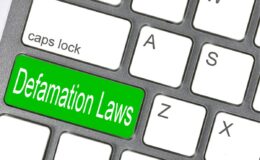Florida Judge Disqualified After Facebook-Friending a Litigant
- By : Cbh
- Category : Social Media
A Florida judge has been directed to recuse herself by an  appellate court after the judge sent a Facebook-friend request to a party during divorce proceedings.
appellate court after the judge sent a Facebook-friend request to a party during divorce proceedings.
Specifically, Judge Linda D. Schoonover was presiding over a divorce and, prior to entry of a final judgment, sent a Facebook-friend request to the wife. Upon advice of counsel, the wife declined to respond. “Thereafter, the trial court entered a final judgment of dissolution, allegedly attributing most of the marital debt to Petitioner and providing Respondent with a disproportionately excessive alimony award.” The trial judge denied a motion to disqualify. A writ was taken and the appellate court reversed.
The Fifth District held, in Sandra Chase v. Robert Loisel, Jr., that:
“[i]t seems clear that a judge’s ex parte communication with a party presents a legally sufficient claim for disqualification, particularly in the case where the party’s failure to respond to a Facebook ‘friend’ request creates a reasonable fear of offending the solicitor. The ‘friend’ request placed the litigant between the proverbial rock and a hard place: either engage in improper ex parte communications with the judge presiding over the case or risk offending the judge by not accepting the ‘friend’ request.”
Interestingly, the Fifth DCA took issue with the Fourth District’s decision in State of Florida v. Domville that a judge’s Facebook “friendship” with an attorney was also grounds for recusal:
“We have serious reservations about the court’s rationale in Domville. The word ‘friend’ on Facebook is a term of art. A number of words or phrases could more aptly describe the concept, including acquaintance and, sometimes, virtual stranger. A Facebook friendship does not necessarily signify the existence of a close relationship. Other than the public nature of the internet, there is no difference between a Facebook ‘friend’ and any other friendship a judge might have. Domville‘s logic would require disqualification in cases involving an acquaintance of a judge. Particularly in smaller counties, where everyone in the legal community knows each other, this requirement is unworkable and unnecessary. Requiring disqualification in such cases does not reflect the true nature of a Facebook friendship and casts a large net in an effort to catch a minnow.”
In Florida, there is a Judicial Ethics Advisory Committee opinion on judges and Facebook as well as another opinion about judicial assistants and Facebook.


